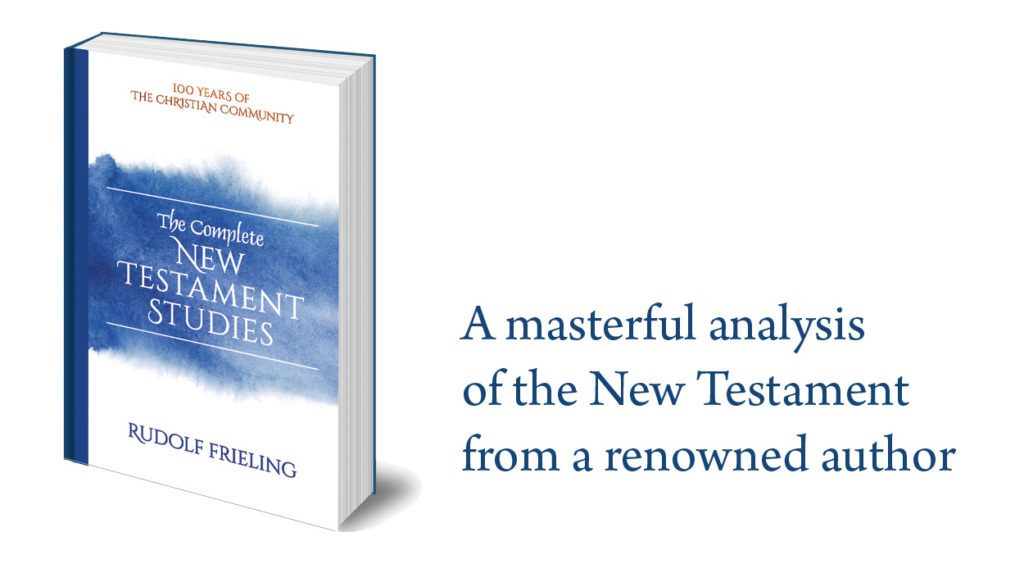Step inside “The Complete New Testament Studies” by Rudolf Frieling
by Floris Books • 27 August 2021 • Extract, Religion • 0 Comments

When faced with the descriptions of miracles and the teachings and parables of Christ as recorded in the New Testament, it can be difficult to know what to make of them. Should they be accepted as the literal truth or dismissed as stories from a less enlightened time?
In The Complete New Testament Studies, Rudolf Frieling draws on his deep knowledge and insight to make the events of the New Testament more understandable to modern readers. He returns to the Greek text to uncover the meaning and power of the original language.
Here, we share an extract from the insightful chapter, Christ Jesus’ Prayers in Seclusion.
As human beings we participate in two worlds at once, the visible and the invisible, and our task is to rightly combine both worlds. If we give our attention only to the realm of earthly visibility, we risk losing our soul to materiality. If we should seek to turn to the invisible realm alone, on the other hand, we would fail in our earthly task and become distant from the world.
The Christ truly became man in Jesus of Nazareth. He was there as helper for his fellow human beings and for their earthly plight. But he also needed to be alone, to withdraw inwardly to fill himself time and again with heavenly powers that flowed into his work on earth. What follows will explore this a little.

The experience of the Jordan baptism signified such a mighty influx into the consciousness and configuration of the being of Jesus of Nazareth that he needed some time to find his way into his new existence. He could not immediately begin his mission. For forty days he remained alone in the desert.
The evangelists here use expressions that can strike us as being almost at odds with the nature of Christ. According to Matthew (4:1), ‘Jesus was led up by the spirit’ from the Jordan basin into the mountains of Judea. According to Luke (4:1), he departed from the Jordan ‘full of the Holy Spirit and was led by the spirit in the desert’. He ‘was led’ – the Greek imperfect indicates something longer-lasting, something that keeps recurring. We might say, ‘He was driven hither and thither in the desert,’ but this was not by the compulsions of restlessness or anxiety as we know them. What made Christ wander to and fro was the wealth, the abundant superfluity of the spirit pouring into him. He has not yet come to inner tranquillity: the spirit surging in him is at risk of bursting the narrow vessel of his human nature. The evangelist Mark expresses this with a drastic violence: The spirit ‘hurled him out into the desert’ (1:12). Nowhere else do the gospels speak of Jesus in this way, of passively ‘being led’, even of being ‘hurled’. We know him otherwise only as the sovereign master of his actions and his sufferings, in the tranquillity and majesty of his ‘I am’.

Clearly this inner mastery must first be acquired after the Jordan baptism. The baptised one needs to withdraw for those forty days to come to terms fully with what has occurred. And it is precisely because the baptism experience is not yet fully integrated, and his inner state has not yet stabilised again, that he experiences the Adversary’s temptations which, according to Matthew and Luke, extend throughout that time – until, finally, the three great temptations have been dismissed. Even the fact that Christ here cites ancient scripture – ‘It is written that …’ – shows us that the fullness of the spirit is not yet fully encompassed by the I, and Christ does not yet speak in his full sovereignty.
But from then on, after the victory has been achieved, such ‘passive’ expressions no longer occur. Now ‘Jesus went in the power of the spirit to Galilee’ (Lk 4:14).
We hope you’ve enjoyed this extract from The Complete New Testament Studies. Find out more about the book here and join our dedicated Religion and Spirituality mailing list here for exclusive discounts and to stay up-to-date our latest new books.